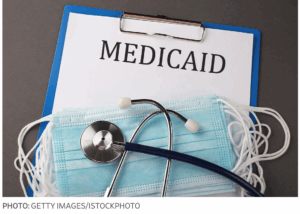
The extent of Medicaid waste, fraud, and abuse keeps getting worse. We already know the federal government admits it made $543 billion in inappropriate Medicaid payments from 2015 through 2024, according to The Wall Street Journal. The One Big Beautiful Bill recently passed by Congress intends to cut the program’s spending by nearly $700 billion over the next ten years.
But none of these cuts impact legitimate Medicaid enrollees. Despite what the Democrats keep saying, no one’s Medicaid is being taken away from them if they were properly enrolled in the first place.
But now there is even more evidence of waste, fraud, and abuse. The Epoch Times reports millions of people are enrolled in government health-care programs in more than one state or are signed up concurrently in multiple programs, costing taxpayers about $14 billion a year, the Centers for Medicare and Medicaid Services announced on July 17.
The announcement came after an analysis of 2024 enrollment data from Medicaid, the Children’s Health Insurance Program (CHIP), and the Affordable Care Act (ACA) Exchange. Investigators found that an average of 1.2 million people were enrolled in Medicaid or CHIP in two or more states in 2024. Another 1.6 million were enrolled in Medicaid or CHIP along with a subsidized ACA plan. The total number of dual enrollees was about 2.8 million.
“Under the Trump Administration, we will no longer tolerate waste, fraud, and abuse at the expense of our most vulnerable citizens,” Health Secretary Robert F. Kennedy Jr. said in a statement cited in the July 17 announcement.
Dual enrollment wastes money without providing additional care for the patient. About 75 percent of Medicaid enrollees and an even higher percentage of ACA plan enrollees are in managed care plans. In these plans, the government pays an insurer a monthly fee to provide all necessary care for the insured person. When a person is dual-enrolled, the government pays twice.
Some Medicaid recipients unwittingly double enroll when they move to another state, enroll in Medicaid there, and forget to notify the state that they moved from. In other cases, Medicaid enrollees who begin to earn more money no longer qualify for the program. They may then sign up for an ACA plan but forget to cancel their Medicaid coverage. Federal regulations require semiannual data checks to weed out dual enrollment. But those checks were temporarily suspended in the COVID-19 pandemic era to make sure people did not lose coverage during the health emergency.
Dr. Mehmet Oz, administrator of the Centers for Medicare and Medicaid Services, said the agency will return to doing regular, thorough checks of the enrollment data. “This is exactly why we fought for stronger [fraud-detection] tools in the One Big Beautiful Bill Act—to go after this type of waste and finally put a stop to paying twice for the same person’s health coverage,” Oz said in a statement.
The One Big Beautiful Bill Act includes provisions aimed at ensuring that only qualified beneficiaries are enrolled in the program. Enrollees will be required to verify their Medicaid eligibility for enrollment every six months instead of once a year. The purpose is to ensure that those whose incomes exceed the eligibility limit are removed and that people not lawfully residing in the country are not enrolled. This provision takes effect in October 2027.
According to Congressional Budget Office data, some 1.4 million people who are not legal residents of the United States are enrolled in Medicaid. Also, under the act, some Medicaid enrollees will be required to spend 20 hours per week in employment, educational activities, training, or community service. This provision, which takes effect no sooner than Jan. 1, 2027, applies only to adults who are not disabled and are not responsible for caring for children or other dependents.

